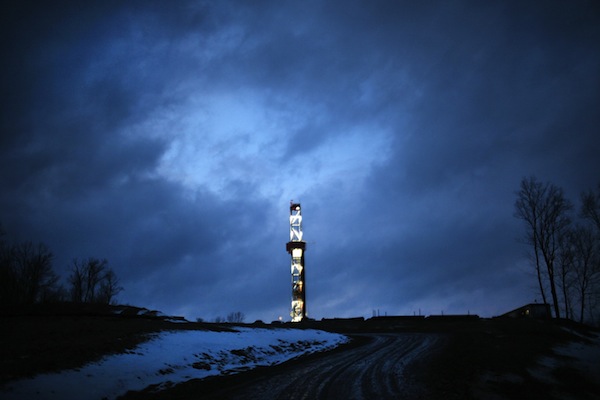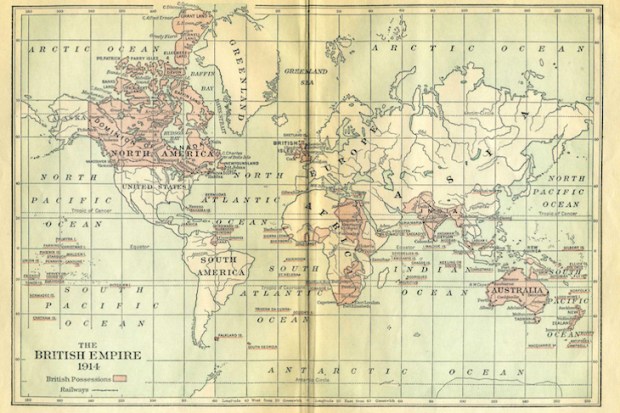A few months after the last election, Oliver Letwin warned Cabinet colleagues that a chunk of Britain’s income would be gone for good after the economic crisis. Letwin, who has always been the Cameron project’s in-house intellectual, told them that some of the complex high finance in which Britain had specialised was never coming back. We would have to develop a new form of economic activity to make up for the loss.
The good news is that this new form is looming into view. Fracking the Bowland Shale alone will, on a relatively cautious estimate, produce the equivalent of 90 years of North Sea gas production.
We will have to wait for the British Geological Survey’s report on the Weald Basin to know how much shale there is in the south to add to the supplies in the Bowland, which runs from Nottingham and Scarborough in the east to Wrexham and Blackpool in the west. But ministers are increasingly optimistic. Shale gas promises to be as significant to Britain’s prosperity as North Sea oil.
Inside the government, the view is that Britain is ten years behind the United States in shale exploration. But we might gain even more from it than the US: we rely more on imported oil and gas, and therefore suffer more from their volatile prices.
The coalition was slow to grasp the importance of shale. The Liberal Democrat control of the Department of Energy and Climate Change and the vestiges of Cameroon greenery meant that little progress was made in its first few years in power; there was even a moratorium on fracking for a year as the government assessed whether it caused too much seismic activity. But George Osborne, Environment Secretary Owen Paterson and Business and Energy Minister Michael Fallon have stopped the government from dragging its feet. A relatively attractive tax regime and a streamlined regulatory process for shale exploration are now in place.
The full economic consequences of shale are still, probably, six to seven years away. But when they come they’ll be substantial: the next election will be a good one to win.
Shale is also changing the international landscape. America’s rapid march to energy independence is already altering its foreign policy priorities. Only 15 per cent of US oil supplies come from the Middle East now and as that number dwindles, the US will become less and less involved in that troubled part of the world. Instead, China — already the world’s largest net importer of oil and soon to be the world’s largest consumer of it — will have the keenest interest in stability and order in the Middle East.
But shale still has its opponents. Some are motivated by environmental concerns. Others are worried about the impact on the appearance of the countryside. There is, moreover, a predictable European Union dimension to this fight. Various environmental non-governmental organisations are trying to use the European Union to stop fracking. In a position paper put out last year, they declared that ‘the development of unconventional gas within the EU runs counter to EU treaty obligations’.
Such a position seems absurd. EU member states have always had very different attitudes to the production of energy. France is proud of its expertise in nuclear energy while in Germany it is a political no-no.Alarmingly, however, these NGOs are treated with great deference in Europe. Take the European Environmental Bureau, which supported last year’s anti-fracking position paper. In a memo to the Lithuanian presidency of the European Union it argued, in typically bureaucratic prose, that, ‘based on the EU’s precautionary principle, for member states where shale-gas exploitation is not banned, ensure that those projects have to undergo an EIA [Environmental Impact Assessment] taking into account the still limited knowledge on this technique and the high risk level associated’. The bureau is also pushing for the ‘environmental impact assessment directive’ to be made far stricter and to take into account climate change. If the bureau got its way, shale gas exploration in Britain and other EU states would be caught up in years of red tape.
Ministers from countries who favour fracking were surprised then to find that Jeremy Wates, the secretary general of the European Evironmental Bureau, was present at a recent meeting of the European Environmental Council hosted by the Lithuanian presidency. Wates was not only in the room, sitting through the entire ministerial discussion, but also had the opportunity to address the council at the end of the meeting. He took the chance to vent all the alarmist ‘green’ arguments against shale.
The bureau has no democratic mandate; it is just a collection of NGOs. But it was still invited to the meeting. As Paterson remarked, no one had asked a representative of pensioners in fuel poverty to come and explain to the council why they would like to see their energy bills come down.
To add insult to injury, the taxpayer is providing the means by which the EEB has influence. The lion’s share of its funding comes from the European Commission. It also receives money from the governments of most member states, including Britain. So, bizarrely, Her Majesty’s government is contributing to a group that argues against its policy priorities at a European level.
At the other end of the spectrum, there is, in places, intense local opposition to energy exploration. As David Blackburn reported in The Spectator recently, many residents in Sussex are vehemently convinced that the countryside will be ruined by this whole process. But this doesn’t have to be the case. In Singleton, on the Sussex Downs, they are drilling for oil in an area of outstanding natural beauty. But this is being done with minimal disruption to the environment.
It has become a cliché to say that Britain is a poorer country since the crash. But shale offers a chance for Britain to become richer. We are sitting on a reserve of energy, and money, that we did not know we had. If we end up not exploiting that, it will reveal a system of governance so dysfunctional that it can look a gift horse in the mouth.
Got something to add? Join the discussion and comment below.
Get 10 issues for just $10
Subscribe to The Spectator Australia today for the next 10 magazine issues, plus full online access, for just $10.
You might disagree with half of it, but you’ll enjoy reading all of it. Try your first month for free, then just $2 a week for the remainder of your first year.














Comments
Don't miss out
Join the conversation with other Spectator Australia readers. Subscribe to leave a comment.
SUBSCRIBEAlready a subscriber? Log in